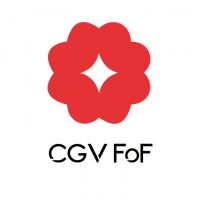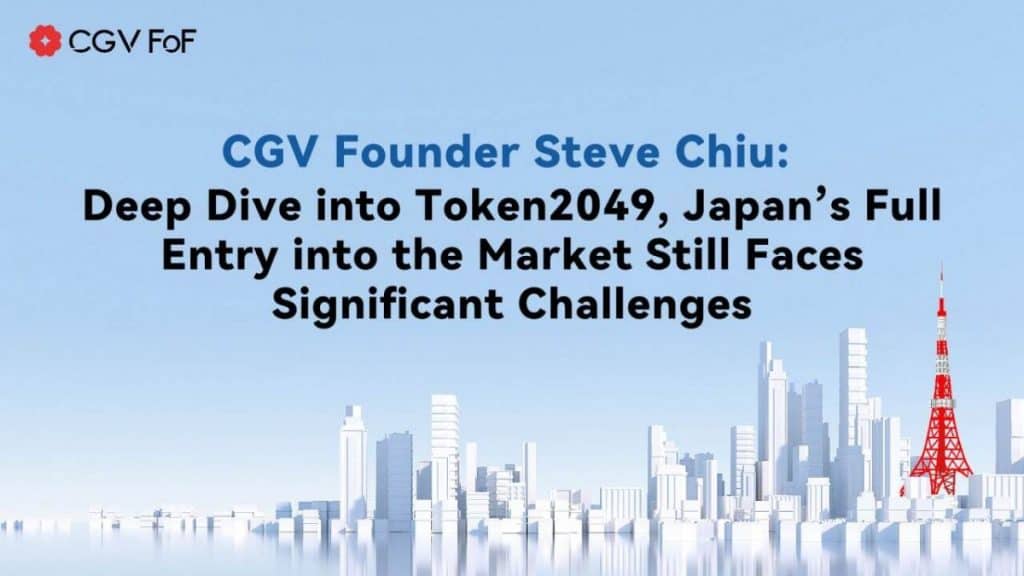CGV Founder Steve Chiu: Deep Dive into Token2049, Japan’s Full Entry into the Market Still Faces Significant Challenges


In Brief
“This was my third participation in the Token2049 conference over the six years since entering the crypto space. Each time, I come with questions and leave with even more,” – Steve Chiu, Founder, CGV.

The route from Tokyo to Singapore is incredibly busy, with over a dozen flights shuttling back and forth each day, most returning at full capacity. In September, amid the bustling and vibrant atmosphere of the Singapore Grand Prix, from Ginza to MBS — the locations change, but the busy crowds and unwavering faith remain constant.
This was my third participation in the Token2049 conference over the six years since entering the crypto space. Each time, I come with questions and leave with even more. Industry conferences are never meant for providing answers; instead, they offer a constant stream of evolving narratives, forward-thinking concepts, waves of unforeseen black swan events, and a multitude of ever-changing policies and regulations.
The previously established is overturned without explanation, and hot topics emerge — seemingly out of nowhere. The key is to keep moving forward, never looking back. In short, change is substantial.
Firstly, there’s a stark division between old and new circles, with a generation gap emerging. Perhaps marking the last bull market or using the pre and post-pandemic periods as a dividing line, seasoned players who have weathered several cycles are now in a period of dormancy, while most of the attendees are fresh faces. It’s heartening to see that trading platforms which stood the test of time appear even more robust, while the older generation projects have almost disappeared from sight.
The NFT track was nowhere to be found. From large-scale posters, offline activities, souvenirs to talk topics within smaller circles, NFTs were conspicuously absent. When it comes to NFTs, project teams were actively explaining, trying to avoid the subject. In its place, there were a variety of AI-related protocols, games, platforms, and computing power. Of course, there was a new path outlined through discussions of Bitcoin Layer 2 and engravings.
The Ethereum ecosystem and ZK series didn’t seem as popular, likely due to the saturated market — something we’ve grown accustomed to.
Furthermore, the influence of Asian funds has waned, dispelling the notion of a mysterious Eastern force. Vitalik’s statement contradicts Hong Kong, where policy instability persists. In reality, Singapore has only harnessed its power as a hub for transit.
What the Singaporean government desires is regulatory compliance in the crypto market, which is gradually moving further away from compliance. China’s nominal absence has left Asian projects in a state of limbo. Aside from becoming limited partners (like us…), Asian funds will find it difficult to achieve significant accomplishments.
However, what’s remarkable is that Indian projects seem to be rising. With their powerful linguistic advantages and technological innovation capabilities, Indian teams and projects are gradually gaining prominence at conferences — from mobile internet to the Web3 encryption industry. Coupled with a vast population base and a weak sovereign currency, India’s teams and projects are beginning to make a name for themselves.
Japan has always played a semi-attending, semi-absent role in the crypto industry. The Japanese government’s conservative approach to the crypto industry has successfully helped the Japanese people avoid many pitfalls from 2022 to 2023. Whether it’s Layer 2 networks, NFTs, or even STOs, Japan still leads in advanced technology and cutting-edge trends. Compared to the rest of the world, Japan boasts exceptional design capabilities, but fewer technical developers than China and the United States.
Compared to Singapore, Hong Kong and Southeast Asia, Japan has a broader market and strong purchasing power. Since 2022, Japan has gradually eased its control over the listing of licensed trading platforms, and recently, it also opened up channels for crypto financing for startups. Regardless of bull or bear markets, Japan is independently accelerating towards the global crypto market. It will face a tremendous challenge ahead.
CGV is an active Japanese crypto fund committed to promoting the construction and development of Japan’s crypto regulatory framework. We lead Japanese projects in going global and also assist global projects in entering Japan.
Faced with such a significant challenge, after engaging in discussions at Token2049, I believe many share our thoughts. The crypto industry is still in a period of uncertainty, and revolutionary innovative applications have yet to emerge. Japanese players should approach the market rationally, gradually enter the scene, and patiently seize opportunities and ultimately, they will eventually see results.
CGV FOF:
Cryptogram Venture (CGV) is a Japan-based research and investment institution engaged in crypto. With the business philosophy of “research-driven investment,” it has participated in early investments in FTX, Republic, CasperLabs, AlchemyPay, Graph, Bitkeep, Pocket, and Powerpool, as well as the Japanese government-regulated yen stablecoin JPYW, etc. Meanwhile, CGV FoF is the limited partner of Huobi Venture, Rocktree Capital, Cryptomeria Capital, etc.
Disclaimer
In line with the Trust Project guidelines, please note that the information provided on this page is not intended to be and should not be interpreted as legal, tax, investment, financial, or any other form of advice. It is important to only invest what you can afford to lose and to seek independent financial advice if you have any doubts. For further information, we suggest referring to the terms and conditions as well as the help and support pages provided by the issuer or advertiser. MetaversePost is committed to accurate, unbiased reporting, but market conditions are subject to change without notice.


CryptogramVenture FoF Asian アジアの暗号化資産ベンチャーファンドオブファンズ




















































